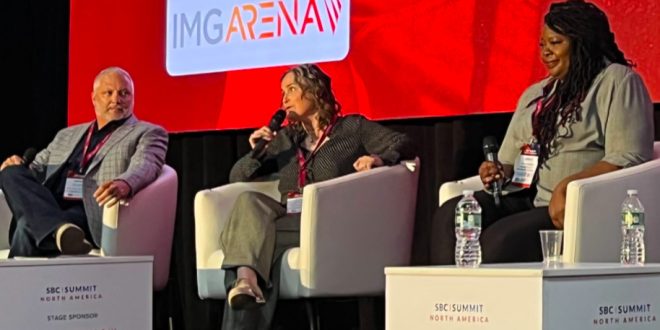Whilst US states have rushed to launch their sportsbook regimes, market observers have been left frustrated by a conservative approach to legislating further igaming verticals.
Frustrations were highlighted by a diverse panel of market stakeholders at the SBC North America Summit, scrutinising ‘iGaming’s convergence with Sportsbooks’.
Four years since PASPA’s federal repeal, the US igaming market has yet to come to fruition as Rush Street VP of Business Development Rob Picard laid out a barren playing field for incumbents.

“We need to reflect on the market dynamics between igaming casino and online sports betting,” Picard remarked.
“On the online casino side, we really have only Delaware with one licence and Connecticut with two. Michigan has 15 licences with no skins, and then there is West Virginia and New Jersey with a handful of skins. There is an opportunity in Pennsylvania but that comes with a high tax rate on slots.”
Though US incumbents have been dealt a tough hand, Picard underlined that current limitations had not impeded sportsbook operators from developing their online casino units.
“Savvy acquisitions will play a part in how sportsbooks enter the market.” – Picard added. “Take DraftKings acquisition of Golden Nugget Online ($1.5bn). There’s no doubt that DraftKings looked at Golden Nugget as a threat and decided to take them down.”
Analysing the DraftKings power-play, Picard warned the audience to “expect more consolidation in the casino market and some attrition”.
Observing how early market dynamics have ‘played out’, Anika Howard, President and CEO of Wondr Nation, astutely pointed to the cultural intricacies of US gambling’s online birth, versus heritage markets such as the UK.
“When you look at the UK, the consumer has been developed out of a culture of betting shops, there was already a sense of acceptance and betting was culturally ingrained with sports.”
The cultural comparison was made against US consumers’ gambling experience that has been dominated by bricks-&-mortar casino engagements and in which US consumers are experiencing and adjusting to a radical change -“In many markets, the consumer is getting both retail and online at the same time,” – a visible dynamic that both sportsbooks and casinos must accommodate for.
Howard reflected that there should be no surprise at the rate of acquisition witnessed by the market, as legacy casino operators began an arms race to build up their digital platforms and brand offering – case in point, Caesars’ acquisition of William Hill and Penn National’s takeover of Barstool Sports.

Having worked with major US casino operators to develop their in-venue digital audiences, Wondr Nation’s CEO underlined casino operators’ “desire to control the whole ecosystem, from within”. Mirroring Picard’s observations, Howard cited that US casino acquisitions would likely be focused on developing digital components of gamification, CRM, loyalty and omni-channel experiences.
Though as stands, market access is limited, Howard asserted, continuing: “We are seeing the casino operators get smart and they have a clear strategy on how to leverage their databases and venue assets.”
“They are now focused on developing integrated touch-points, to better localise communications and their marketing, to customers” – Howard cited as a clear vantage point for traditional casinos.
Casino operations veteran, Luisa Woods, Vice President, Marketing and Gaming Entertainment at Delaware North, viewed a speculated battle between US bricks-&-mortar casinos vs new deep-pocketed sportsbook brands as a divergence from the challenge at hand.
“We have to remember that the online casino market will be largely consumer-driven. They are going to play where they want to play and on whatever they want to play on.

Woods cited her disappointment at several casino bosses “that believed that they can simply defend against the market’s evolution – they are treating this as an amenity as if it something that won’t be fundamental to their business”.
A generational challenge beckons a number of US casinos, as Woods stated that a vast amount of B&M casinos had not revised customer strategies in decades or let alone considered the impact of online gambling’s expansion on their businesses.
“Most casinos in the US typically sit close to a state border. That’s because they want to draw customers across state lines into their facilities. When you start looking at the state-by-state digitisation of gambling, this changes everything.”
Leaving the audience with a warning, Woods remarked: “Their customer no longer has to get in their car to go gambling, when he can do it at home. Digital gaming means that B&M casinos can no longer be a homologous entity, or they will stand to lose everything.”









